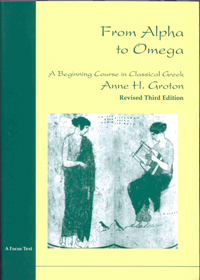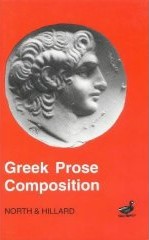| Aging | Ancient Greek | Crime | History (non-USA) | Language and Linguistics | Natural History | Philosophy | Political Science | Psychology | USA Modern History |
 New books on writing poetry.
New books on writing poetry.
 Books read.
Books read.

|
From Alpha to Omega
by Anne H. Groton |

|

|

|

|

|
The main value of this complaint about the dramatic decrease of education and interest in learning the language and knowledge of the Ancient Greeks is its book list).
Three arguments to the book [pp. xviii-xx]:
| " Hellenic culture — an idea not predicated on race — is not just different from, but entirely antithetical to any civilization of its own time or space." The polis is ... an institution in deliberate opposition to Eastern approaches to government, literature, religion, war, individual rights, citizenship, and science. ... Greece ... was not Tyre, Sidon, Giza, or Persepolis, nor was it Germania, Britannia, or Gaul. The core values of classical Greece are unique, unchanging, and non-multicultural, thus explaining both the duration and dynamism of Western culture itself — culture that we as Western intellectuals must stop apologizing for but rather come to grips with, as the sole paradigm which will either save or destroy the planet." |
| " The demise of Classical learning is both real and quantifiable. " |
| " Our present generation of Classicists helped to destroy classical education. While their hypocrisy in living their lives differently from what they advocate, their obscurity of in language and expression, their new religion of postmodernism, theory, social construction, and relativism are neither novel nor profound — the next century will scarcely notice their foolishness — they are nevertheless culpable and they must be cited and condemned. ... Our generation of Classicists ... failed utterly, failed to such a degree that the Greeks now play almost no part in discussions of how the West is to evolve in the next millennium. Worse, the dereliction of the academics was not just the usual wage of sloth, complacency, and arrogance — even to destroy — the Greeks, to assure the public that as Classicists they knew best just how sexist, racist, and exploitative the Greeks really were. " |
Dipped into the book, including their subsection on Homer and Literary Theory:
| " Literary theory offers unlimited ways to argue that the texts do not say what they appear to say. Rather than speak on meaning, themes, or images, or even structure, the emphasis now is no 'rhetoric' and 'discourse' ... Even studies of something as concrete as Homeric similes get lost in the theoretical jargon. " |
And so on.
But good parts are:
| " Greek comes at a price. The ancient Greek verb has over 350 forms. It appears in seven tenses ... Only with mastery of these action words do you realize that such arcane statutes are often broken: the Greek verb is, in short, a mess. ... Almost every Greek noun appears in about ten different forms. Adjectives — which adopt any of three genders — triple that number of spellings. ... Introductory Greek, then, is largely, we must confess, memorization, from declension to conjugation, spiced with vocabulary drill and rudimentary grammar. " |
But even this chapter has an annoyed tone and bossiness that makes one glad to skip over this chapter to the final book lists.
| " In an [i.e. this] age of complacency, ... it is valuable to revisit Demosthenes and to relearn that hard talk alone warns us that things are not just OK, but far worse than we think. " |
His annotated list shows:
| "Ten one-volume books ... They are rather specific and scholarly investigations of particular aspects of Greek culture, history, and literature that broaden rather than narrow our interests, that use the esoteric tools of classical scholarship to enliven rather than stultify wonder about the past. ... That eight of the ten works were written by authors from the United Kingdom might suggest how impoverished Classics has become in America, where high salaries have not ensured that our own grandees can either write or think broadly" |
shows:
They seem to prefer authors like de Ste. Croix whom they say is "someone now angry, now exasperated". For all the author's claims to the high ground of logic, they made two errors (20%) in alphabetizing this 10-entry list!
Glossary: A, B, C, D, E, F, G, H, I, J, K, L, M, N, O, P, Q, R, S, T, U, V, W, X, Y, Z.
See:

|
 Links. Links.
 Home. Home.
|
| Copyright © 2009 by J. Zimmerman (except for quotations). |